Uncle Ho's diplomatic style
(Baonghean.vn) - His thoughts have always been the guiding principle for the Vietnamese revolution in general and diplomacy in particular to develop, gradually improving Vietnam's position in the international arena.
Throughout his life of fighting for national liberation, independence and freedom of the people, Ho Chi Minh had relations with many friends around the world, including like-minded friends and enemies, in many different situations and positions. His skillful behavior in foreign affairs contributed significantly to the victory of the Vietnamese revolution as well as the movement for common peace of mankind.
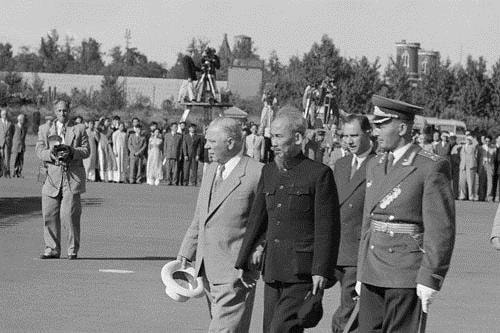 |
| President Ho Chi Minh visited the Soviet Union in 1955. |
In the process of implementing the foreign and diplomatic policies of our Party and State, Ho Chi Minh always determined the most important goal is to protect and maintain the independence and sovereignty of our country. He pointed out: "Independence means we manage our own internal affairs without allowing anyone to interfere" and independence and sovereignty must be closely linked to national unity and territorial integrity. He also affirmed: "The South is the blood of Vietnam, the flesh of Vietnam. Rivers may dry up, mountains may wear away, but that truth will never change!"
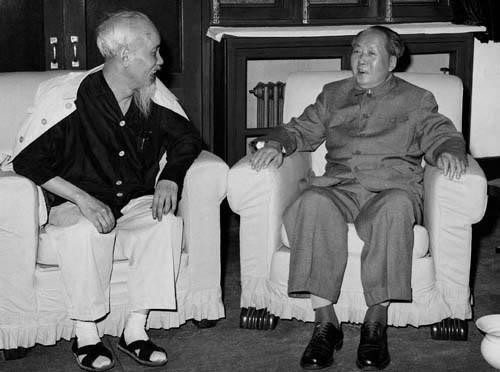 |
| Uncle Ho received Chinese Chairman Mao Zedong |
Firm in principle, mobile and flexible in strategy, “responding to all changes with the same consistency”, this is the motto that President Ho Chi Minh advised Mr. Huynh Thuc Khang before he went to France for negotiations in 1946. After the August Revolution in 1945, the young revolutionary government of the Democratic Republic of Vietnam faced a “precarious” situation, having to face both internal and external enemies at the same time.
In order to maintain the government, his motto was: We are ready to make concessions to find a common solution. However, national independence and national freedom must not be violated. During this period, grasping the French-Kingdom conflict, with his own mettle, Ho Chi Minh had clever but extremely decisive diplomatic responses. In President Ho Chi Minh's diplomatic policy with the Chinese army, he cleverly used the method of "Goujian diplomacy", this is the policy that Uncle always emphasized to the cadres working in foreign affairs.
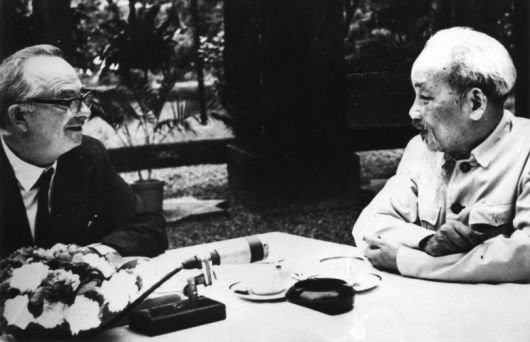 |
| President Ho Chi Minh and journalist Wilfred Burchett |
President Ho Chi Minh did not pay attention to the equality of positions in his interactions with people of different classes in the world, making everyone feel close and friendly. Throughout his life of revolutionary activities, Ho Chi Minh was willing to peacefully enter the lives of poor working people in the nations of the world, earning a living by very simple jobs such as cooking, copying paintings, shoveling snow, etc. Every action of his was very skillful and careful, with an appropriate attitude and behavior to avoid diplomatic formalities when necessary while still maintaining sincere feelings towards friends, comrades, and brothers who had stood side by side and helped him on the path of revolutionary activities.
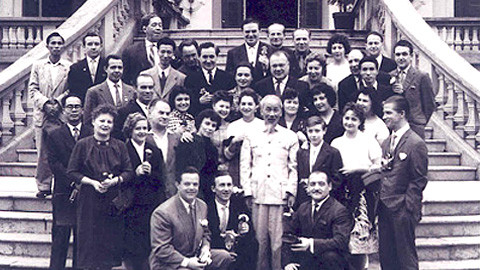 |
| President Ho Chi Minh with international friends. |
Ho Chi Minh's flexible, courageous, intelligent and confident behavior in foreign affairs. Whether the interlocutor was a head of state, a Party leader, a politician, an intellectual or just an ordinary worker or farmer, Ho Chi Minh was always proactive in his behavior. That proactiveness was both natural, simple, sincere and delicate, expressed very vividly and richly in a proactive posture, with simple, concise and easy-to-understand language, with a smile that always brought surprise, erased all distances, and brought high efficiency.
Combine and promote the combined strength of military, politics, and economy in diplomatic work. President Ho Chi Minh said: "If we do not have real strength as a foundation, we cannot talk about diplomacy". Sometimes he compared: "Real strength is like a gong, diplomacy is like the sound of a gong, the louder the gong, the louder the sound". Thus, whether diplomatic victories are big or small, diplomatic activities are favorable or difficult depends on many factors, in which the main decision is real strength. However, we understand that national strength is forged by the combined strength of the whole nation, not just material strength, although material strength is extremely important.
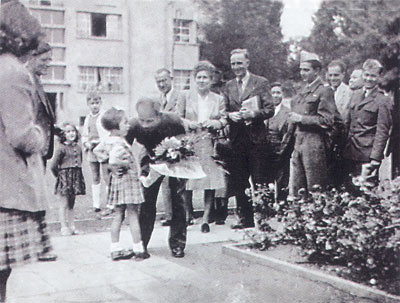 |
| French children give flowers to Uncle Ho. |
In the process of diplomatic struggle, foreign languages are used as an important weapon in foreign affairs. Ho Chi Minh knew many foreign languages, of which he was fluent in 6: Chinese, French, English, Russian, German and Thai. He believed that if one did not know or was not fluent in the host country's language, the ability to research and communicate would be limited. Especially, in private contacts on the sidelines of conferences, if one did not have a good foreign language, the cadre would lack confidence, leading to inferiority complex and limitations in foreign affairs activities. And in many interviews with foreign reporters, he directly answered in foreign languages, from which all the meanings of the nation's just struggle were fully conveyed to the people of the world without the need for any translation means.
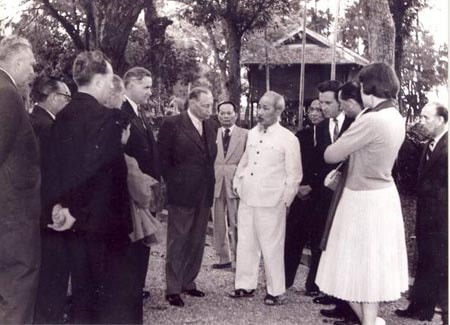 |
| President Ho Chi Minh received a delegation of the former Czechoslovak National Assembly at the stilt house in 1960. |
Ho Chi Minh pointed out that: "Cadres are the root of all work, all success or failure depends on good or bad cadres". Therefore, the team of foreign affairs cadres must have full qualities and mettle and be gradually standardized, must have good political qualities, grasp and skillfully apply the Party's foreign policy; have professional qualifications, expertise and good foreign languages, contributing worthily to the diplomatic achievements of the country as well as the entire revolutionary cause of our nation in the current integration period.
Peace
(Synthetic)
| RELATED NEWS |
|---|

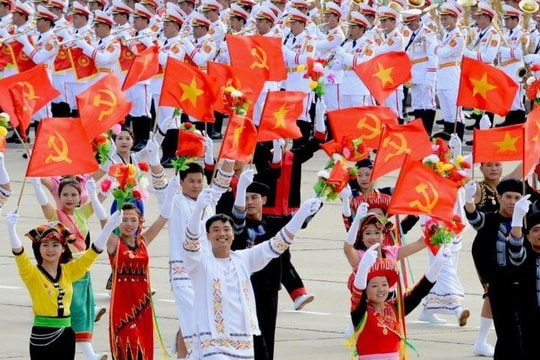
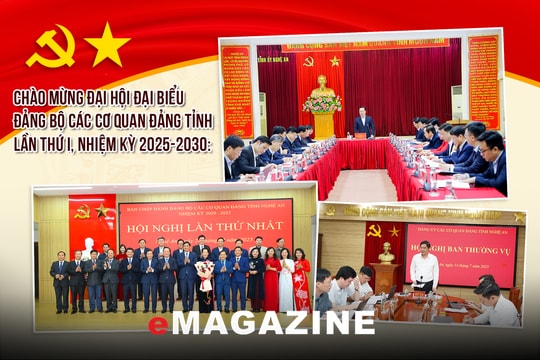
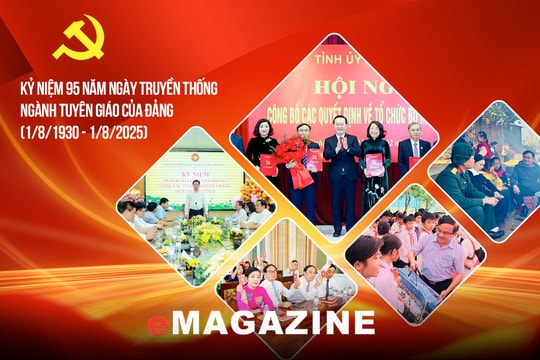
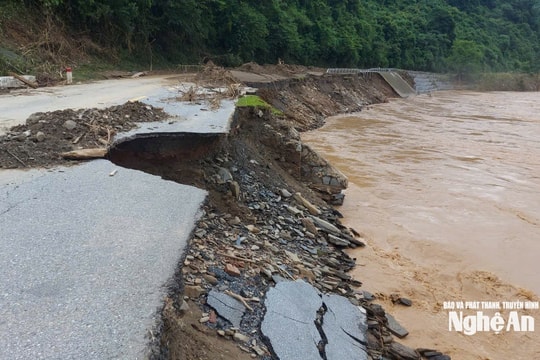
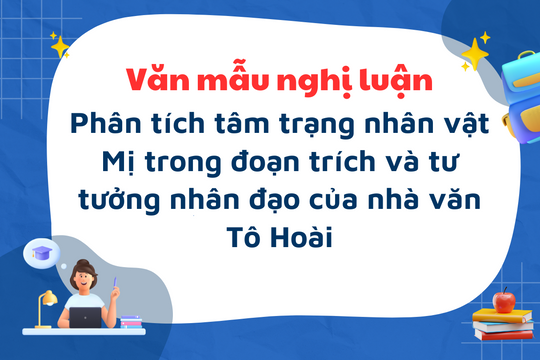
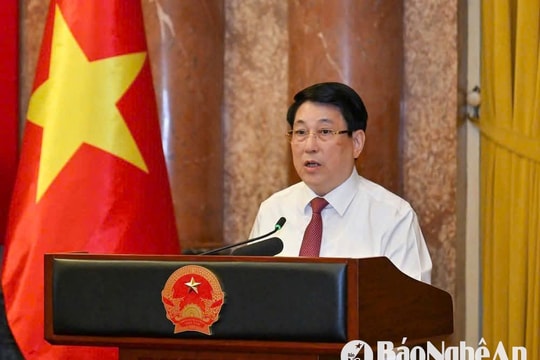
.jpg)
